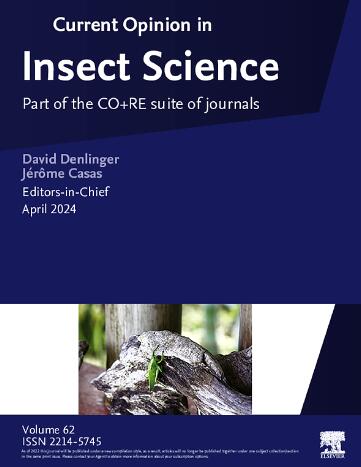人类活动对食草昆虫生态免疫学的影响。
IF 4.8
1区 农林科学
Q1 BIOLOGY
引用次数: 0
摘要
昆虫食草动物生态免疫学涉及食草动物免疫力与其天敌之间复杂的相互作用,以及这些相互作用对环境因素(包括植物抗食草动物毒素)的反应。植物毒素会影响食草动物的免疫力,导致免疫增强或免疫抑制,进而影响它们对寄生虫和病原体的易感性。不同地区不同物种的食草动物免疫反应各不相同,这反映了它们对当地环境条件和天敌压力的适应性。此外,气候变化、植物驯化和入侵物种等人为因素也在改变这些生态免疫动态。这种变化会在食物网中产生连锁反应,不仅影响食草动物及其天敌,还会影响更广泛的群落结构。通过了解这些复杂的相互作用,我们可以更好地预测生态系统对环境变化的反应。本文章由计算机程序翻译,如有差异,请以英文原文为准。
Anthropogenic effects on the eco-immunology of herbivorous insects
Insect herbivore eco-immunology involves complex interactions between herbivore immunity and their natural enemies, and the responses of these interactions to environmental factors including plant anti-herbivore toxins. Plant toxins can affect herbivore immunity, leading to either immunoenhancement or immunosuppression, which in turn influences their vulnerability to parasitoids and pathogens. Herbivore immune responses differ among species regionally, reflecting adaptations to local environmental conditions and natural enemy pressures. Additionally, anthropogenic factors including like climate change, plant domestication, and invasive species are altering these eco-immunological dynamics. Such changes can ripple through food webs, affecting not only herbivores and their natural enemies but also broader community structures. By understanding these complex interactions, we can better predict ecosystem responses to environmental change.
求助全文
通过发布文献求助,成功后即可免费获取论文全文。
去求助
来源期刊

Current opinion in insect science
BIOLOGYECOLOGYENTOMOLOGY-ECOLOGY
CiteScore
10.40
自引率
1.90%
发文量
113
期刊介绍:
Current Opinion in Insect Science is a new systematic review journal that aims to provide specialists with a unique and educational platform to keep up–to–date with the expanding volume of information published in the field of Insect Science. As this is such a broad discipline, we have determined themed sections each of which is reviewed once a year.
The following 11 areas are covered by Current Opinion in Insect Science.
-Ecology
-Insect genomics
-Global Change Biology
-Molecular Physiology (Including Immunity)
-Pests and Resistance
-Parasites, Parasitoids and Biological Control
-Behavioural Ecology
-Development and Regulation
-Social Insects
-Neuroscience
-Vectors and Medical and Veterinary Entomology
There is also a section that changes every year to reflect hot topics in the field.
Section Editors, who are major authorities in their area, are appointed by the Editors of the journal. They divide their section into a number of topics, ensuring that the field is comprehensively covered and that all issues of current importance are emphasized. Section Editors commission articles from leading scientists on each topic that they have selected and the commissioned authors write short review articles in which they present recent developments in their subject, emphasizing the aspects that, in their opinion, are most important. In addition, they provide short annotations to the papers that they consider to be most interesting from all those published in their topic over the previous year.
 求助内容:
求助内容: 应助结果提醒方式:
应助结果提醒方式:


